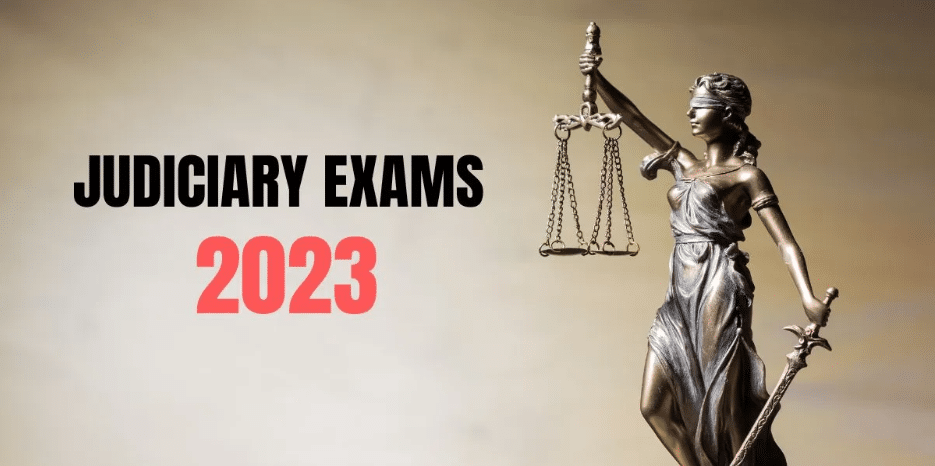
A COMPREHENSIVE GUIDE ON JUDICIARY EXAMINATIONS
One of the trickiest examinations in India is the one for the Indian Judicial Services. Thousands of applicants appear for the exam each year in the hope of serving as judges. The examination is conducted every year by the UPSC.
Eligibility Criteria: Judiciary Examination
Online or postal applications can be made for the Indian Judicial Services Exam. For general category candidates, the application cost is 2500 rupees and for SC/ST/OBC candidates, the application cost is 1000 rupees. A completed application form must be supported by certified copies of documents attesting to the applicant’s age, education level, caste status, and physical handicap (if any).
The eligibility criteria that are certainly discussed in every RJS Coaching institute are as follows:
- Candidates must hold a degree in law from a recognized university in order to be eligible to take the exam.
- Only nationals of India can submit applications.
- The candidates must have reached the age of 21 and are under 35 years old on the date of the examination’s announcement.
- Candidates who are currently employed by the government are also eligible to apply as long as they meet the previous criteria and will be eligible to retire within three years after being appointed as a judge if selected.
- Candidates who have been expelled from government service or found guilty of an offense involving ethical misconduct are ineligible to apply.
Stages of Examination: Judiciary Examination
- Stage I: It functions as a preliminary exam for the main examination and comprises MCQs of an objective nature. When generating the final merit list, the scores earned in the preliminary examination aren’t taken into account. State-by-state variations in the minimum qualifications are probable.
- Stage II: It is an examination of a subjective nature. There are between three and four papers in it. When preparing a final merit list, the marks obtained in the main examination are taken into consideration. State-by-state variations in the minimum qualifications are probable.
- Stage III: The candidate is assessed at this stage based on their general knowledge, personality, and other qualities. The candidate must receive at least 20 out of the 50 eligible marks at this stage in order to be selected.
The Main Examination will be open to candidates who qualify for the Preliminary Examination. Those who qualify for the main exam will next receive an interview call. Following the preparation of a merit list based on the results of the examination’s three stages, candidates are going to be admitted to various positions in the judicial services of India as needed.
Effective Tips: Judiciary Preparation
- The initial and most important step is to keep up consistency. You should also develop a plan of action for your preparation, including a timetable that must be adhered to with the greatest amount of integrity.
- Each stage of exams should be prepared using a separate strategy. For example, while the main exam calls for a selective study plan based on the commonly asked questions, it is able to be accomplished by resolving questions from previous years; the preliminary examination requires the candidate to have comprehensive knowledge of the specifications of numerous laws.
- Gaining a general understanding of the law can be obtained by reading newspapers, legal journals, and reports recommended by various RJS Coaching institutes issued by the Supreme Court and the lower courts. For their broad legal knowledge studies, candidates can also use reliable books and magazines.
- Understanding the format of the exam as well as developing time management skills will be enhanced by solving questions from previous years from multiple states uploaded on different websites of RJS Coaching institutes.
- If you know a judicial officer who has recently been selected, seek their guidance, it can be very helpful for your preparation.
Is Judiciary the Right Choice?
Do not continue preparing if you are still not asking yourself this question yet. And consider whether you believe this is the proper route for you for a moment (or two). It serves no purpose to study for a judicial service exam that you do not believe is a good fit for you. Any position, whether in marketing, finance, or social work, demands a certain set of abilities. However, some people who lack those abilities can pick them up through hard work and perseverance.
Judicial Services are the same, in this respect. We are requesting introspection from you because you will be dedicating an entire year (or more) to becoming a judge and working in this field for the rest of your professional life. Some of you might have to give up a great employment or academic opportunity in order to prepare for the examination.
So, if you’ve decided to pursue a career as a judge, start putting together your application as soon as possible. Make an outline of the curriculum, highlight the most important subjects, read the test questions from previous years, and then get ready to travel!



